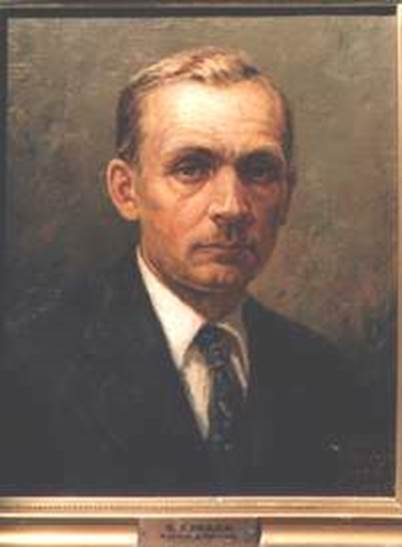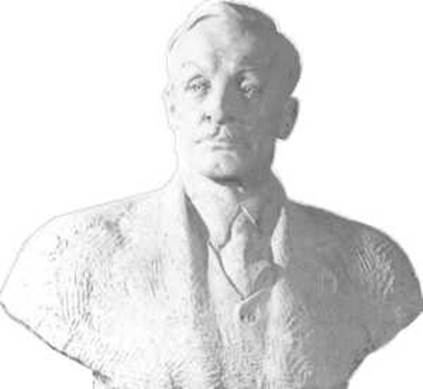| .
YANKA KUPALA
|
Yanka Kupala
Kupala is the pen name of the outstanding Byelorussian poet, Ivan Lulsevich. According to folk legends, the short July night of Ivan Kupala (St. John the Baptist) - a very popular Slavic holiday -is when fern begins to bloom in the thick of the forest. This herb is believed to possess some magic power. He who finds it and tears away its flower shall forever be happy....
The son of a landless Byelorussian peasant, Dominik Lutsevich, Ivan (or simply Yanka) sought the legendary'flower of happiness not in the thick of the forest but in the depths of human life. Not for himself, but for his downtrodden people who for centuries had been destined to bear the unbearable yoke of national and social oppression.
For the first time, the name of Yanka Kupala appeared on May 15, 1905, in the newspaper Severo-Zapadny Krai
(The North-Western Land), under his poem A Muzhik.
Both the period and the circumstances surrounding his poetic debut seem unusual and significant, as tokens of the future ascend, above the horizon of Byelorussian and world culture, of not simply another literary star, but of a whole galaxy. Together with Kupala, or thanks to him, such extraordinarily endowed personalities as Tsiotka, Maxim Bogdanovich and Yakub Kolas emerged. However, Yanka Kupala was the first,
the founder of a new Byelorussian literature, its architect and constructor. He was that trailblazer which is found in the culture of every nation, as Pushkin was in Russian culture, Shevchenko in Ukrainian, Mickiewicz in Polish, and so on.
The special place which Kupala occupies in Byelorussian literature may be determined from the words of Yakub Kolas, his distinguished contemporary; "Differences in genre notwithstanding, the creations of Yanka Kupala seem to me as a single book, even as one song glorifying the work of the people.
"Half of this song is angry and sad -these are the works of the pre-October period, when the poet used his inspired verse to place himself, courageously and selflessly, in the camp of those fighting for the social and national liberation of their people.
Реклама

"The second half is cheerful, permeated with the enthusiasm of creativeness. It belongs to the period when the Byelorussian people achieved their statehood and, guided by cxoerienced leaders, embarked upon the road leading to socialism and, further, to communism."
Kupala launched Byelorussian literature to high world-embracing orbits, treeing it from the triteness of unimaginativeness, stylishness and bookishness. His civic determination and ardent enthusiasm of an innovatr gave birth to new ideas and, more importantly, to new poetic forms, genres, rhythms andones, ll marked by finesse and stylistic flair. 
Yanka Kupala
However, Kupala's major contribution to literature in the period before 19l7 was his voice of social protest. In his poem The Song of a Free Man,
he openly calls on the people wage a struggle. Czarist censors qualified it as "antiState," since, reading it, "one cannot but notice an open encouragement of obviously rebellious actions."
His humane verse, his "love of the sun" ("I bow to the Earth and the Sun, / I'm a son of the Earth, a free son of the Sun.") brought him close to his great contemporaries like Maxim Gorky, Ivan Franko and Lesya Ukrainka.
After the October Revolution, the poet envisioned his nation liberated, free from its social and national shackles. In place of zhaleika
folk songs of grief, the poet, with trumpet in hand, urges his kin toward building a new life.
Living for twenty years under Soviet rule proved an important landmark on the poet's road toward creative accomplishment. This period dictated new poetic themes, ideas and images.
One by one, his collections of verse were published, having their effect on extensive reading circles. His works were translated into other languages -particularly into Russian which made Yanka Kupala known internationally.
In his verse after the Revolution, his lyrical hero seems to merge with the masses, reaching that supreme unity of which Pavlo Tychyna, a celebrated Soviet Ukrainian poet, once said, "I'm the people." At the same time, Yanka Kupala paid much attention to the individuality of his characters, thus asserting the impetuous progress of the personality and the richness of the soul of the people, as revealed in the new social epoch.
The bard of rejuvenated Byelorussia, Kupala was amongst the first to lay golden bridges between his and other nations. In 1921, he translated into Byelorussian The Internationale and The Lay of the Host oflgor.
He was an internationalist poet. As an admirer of Pushkin, Shevcheriko, Mickiewicz and Slowacki, as a keen interpreter of the Indian epic Mahabharata and
the Armenian David Sasunski.
the Byelorussian poet glorified brotherhood of nations and literatures in The Ukraine, Georgia, To Djambul, To Shining Shota Rustaveli, On the Memory of Suleiman Stalski.
Реклама

When the Soviet country was invaded by the Nazi hordes, the poet raised his wrathful voice at the All-Slavic Assembly in Moscow. Together with outstanding Ukrainian cultural figures Maxym Rylsky and Olexander Dovzhenko, he signed The Appeal to Brother Slavs.
Yanka Kupala was bound to the Ukraine and her literature by ties of unbreakable, fraternal affection. Ukrainian themes, national coloration and Ukrainian folk images are found in such works as Am I a Cossack?, I Saw It. Bondarivna, etc.
Shevehenko's Kobzar was one of the books Kupala read in his youth. Later, the Byelorussian poet admitted that this book became that stimulus which stirred him to creative awakening, to becoming aware of himself as a son of an oppressed nation.
In 1909, Yanka Kupala wrote two poems The Memory of Shevchenko (February 25. 1909) and Shevchenko's Memory -
which started the Byelorussian Shevchenkiana
poetic series. In the first of these impassioned creative tributes, the Byelorussian bard acknowledges the truly boundless influence of the Kobzar's revolutionary Muse on vast social strata and expresses heartfelt admiration of this impact as a son of the Byelorussian people:
In the north, in the south, in the east, In the west, where the sun sets,
The Kobzar plucks the strings of human souls. In a cabin, a palace, a prison cell, a tavern, He stirs hearts as a warden does with his bells.
"His verse reaches us every time, We listen happily to our neighbor, We add our flowers to his garland. Brother, dear, Byelorussians salute you"
This motif is stressed even more in the second poem. Kupala refers to the Kobzar as the father of not only Ukrainians but also Byelorussians.
Shevchenko's image prompted Kupala to write the epic poem
The Fate ofTaras. It turned out as a kind of life story of the great Ukrainian bard, full of charming lyricism, a soft poetic narration.
The meter of
The Fate of Taras is characteristic of Shevchenko's
kolomiyka - a lively Western Ukrainian folk song or dance. Maxim Gorky, the great Russian author, noted at one time that he knew of no other poet, except Yanka Kupala, who had so completely and profoundly utilized the Kobzar's creative principles.
Early in his poetic career, Yanka Kupala translated A Thought, To Gogol
and other work5 of Shevchenko. In the post-October period, Kupala edited his earlier translations of Shevchenko and began to work on others with great enthusiasm. His pen lent new splendor to such poems as A Dream. My Testament, The Caucasus, Kalerina. The Night of Taras and Ivan Pidkova,
In fact, most of Kupala's translations of Shevchenko served as the basis of the first complete Byelorussian version of Kobzar
which he edited.
In 1939, Byelorussia celebrated Shevchenko's 125th birth anniversary, together with the rest of the country. Yanka Kupala appeared with a number of speeches and articles, dedicated to the occasion.
In the 1930's and 1940's, Kupala often visited the Ukraine. He readily admitted, "I love Ukrainian literature - perhaps, more than any other. Needless to say, Shevchenko remains my number one Ukrainian poet. Of modem poets, Pavlo Tychyna takes first place.....". His personal contacts with Ukrainian literati contributed fruitfully to the enhancement of unity between Byelorussian and Ukrainian literature. One of the first Byelorussian academicians, Kupala was voted a member of the Academy of Sciences of the Ukrainian SSR. To this end, one is reminded of Maxym Rylsky who said, "I don't exaggerate when I say that, to Yanka Kupala, the Ukraine was like a second homeland."
Beginning in the 1900's, his name appeared in the, Ukrainian reading circles. A prominent Ukrainian Slavist, Ilarion Sventsitsky, included Kupala's Why Do You Sleep? and There,
in the language of the original, into his book The Renaissance of Byelorussian Literature
(1908). He kept in touch with the poet who supplied him with his books and manuscripts. Much was also done to popularize Yanka Kupala by Tsiotka (lit.. Auntie, pen name of Aloiza Pashkevich, a prominent Byelorussian revolutionary poetess) who spent some time in Lviv.
Maxim Gorky sent Mikhailo Kotsyubynsky his translation of Kupala's And Who Goes There
together with the notes, pointing out that "this Byelorussian hymn" had excited him tremendously. In 1916, this poem was recited, in Byelorussian, at a poetry evening in Poltava. According to those present, it made a great impression.
Many of Kupala's books were printed dozens of times in the Ukraine. A number of leading Ukrainian men of letters contributed their translations of the poet and dedicated to him their own verse. The unforgettable Maxym Rylsky perhaps most eloquently presented the image of his Byelorussian counterpart. He wrote a poetic triptych, entitled To Yanka Kupala, For Yanka Kupata
and Yanka Kupala.
The last of the three has the following lines:
... Those in acquaintance with him
Shall never forget
The human warmth in his eyes;
He was the knight of a lofty dream And fought what was false and sly. He cut a precious stone
of the Byelorussian tongue, Working on it with so much loving care. He was a wonder himself. Held in esteem by the nations of kin, Just like Shevchenko was held. He taught us to respect A pair of able hands the best. Down in history our Yanka went, As ever alive as the image, with wings, Of his Byelorussian land."
The first rays of the hot July sun illuminate a sizable spot of land not far from a log house in the village of Vyazintsi where a child, christened Yanka, was bom almost one hundred years ago. It is here that the traditional Kupala festivals of poetry are held, attracting people from neighboring towns and villages and from the Byelorussian capital. Yanka Kupala created an imposing poetic image of his people, revealing for all to see the wealth of their soul in his verse , epic, publicistic and epistle writings and plays.
By tradition, the General Assemblies of the UN are attended by celebrated Byelorussian men of letters as members of delegations of the Byelorussian SSR. All of these have, at one time or another, been able to visit Arrow Park to place flowers at the foot of the monument to their famous countryman which proudly stands beside the monuments to Taras Shevchenko, Alexander Pushkin and Walt Whitman. The song of the Byelorussian lyre is heard amidst the swishing of the ocean surf, the rustling of copper-red maples. In the poet's staring eyes, one can discern the glimmering reflection of an ever-flaming torch. That torch gives the eerie light of the Kupala night, the light recaptured from the sinister darkness of the night. That torch is being raised high over the bearer's head, so it can be seen by all who are determined to be "called human."
|